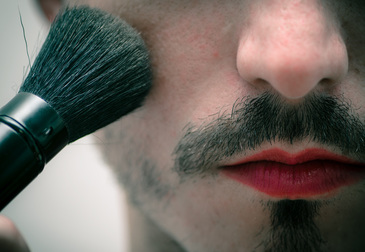|
When Bruce Jenner’s transition became a focus of public attention, it got me thinking about what the attention means for transgender folks, and particularly transgender youth. Having only known a few transgender people myself, but having colleagues who are either trans or dedicated to research that supports the understanding of transgender lives, I decided to get someone to write a guest post on what we should all be doing to support transgender people and particularly transgender youth. Meet Chris Dungee. He is a counselor who speaks at colleges and universities about LGBT issues for faculty and staff development. He also transitioned himself from female to male, so I knew he would be the perfect resource with both professional and personal experience with transgender issues. Here is what he wants us to know:
I can remember when the first stories about Bruce Jenner’s possible transition began to circulate in 2014. I would come across scandalous headlines such as, “Bruce Jenner has surgery to decrease Adam’s apple.” And, “Jenner reveals suspiciously smooth legs!” These articles featured images of Bruce being accompanied out of the backdoor of a hospital by several nurses; whisked away into a black vehicle with heavily tinted windows. The students in the community college I serve as a counselor at were all aflutter over it. America’s Olympic hero was turning into a lady and it was indeed salacious. Fast forward to April 24th of this year and Diane Sawyer lands the explosive first interview with Caitlyn Jenner as she opens up about her lifelong struggle of being a transgender woman. To be fair, transgender issues had been talked about in the media already due to the visibility of people such as actress Laverne Cox and journalist/activist Janet Mock. “Transparent”, an original program from Amazon allowed viewers to experience the day-to-day life of someone in transition. But the Caitlyn Jenner story reached stratospheric heights. It appeared to be the number one story in the world. Any news is good news? Two months later it is difficult to gauge what all of this hoopla means for trans folks and our cause. Yes, everyone is talking about it and so many people seem to be understanding and supportive but let’s break down what is going on: The Good Visibility – I have done several speaking engagements where people tell me they never knew exactly what it means to be transgender. For many, hearing the pain that Caitlyn Jenner goes through instantly humanized trans individuals for them. This is key. We know that Americans are more likely to empathize and support lesbians, gays and bisexuals if they know someone who identifies as such. Whether you are nostalgic for her days as an Olympian or tune in to see her on “Keeping Up with the Kardashians” every week she became that person you know. So, perhaps her visibility, and the reaction to her visible transition, means we are finally on the path to acceptance. Trans Rights – There are a litany of political and social issues affecting the trans community. Caitlyn touched on many of them in her interview. Access to trans-inclusive health care, ease of attaining and changing documentation, finding employment/housing, and enacting anti-discrimination laws are a few. I have found that for the most part, the average caring person is appalled to find out that only 16 states have laws that prohibit discrimination based on gender identity. Also, reports of violence against transgender women of color are at an all-time high. The Human Rights Campaign has gone as far as to call this a “crisis.” Caitlyn mentioned this specifically which left me pleasantly surprised. Lastly, trans Americans are faced with spending tens of thousands of dollars to attain the surgical procedures they need to align their bodies with their souls. Only a handful of health insurance companies view trans specific health issues as non-elective. These issues are finally being talked about on a wide scale. Acceptance by the LGB community – The acronym LGBT stands for Lesbian, Gay, Bisexual and Transgender, but historically the LGB has not always been welcoming to the T. The winds have shifted within the community as a whole and I am sensing less fear. There has always been this idea that those weird trans freaks will make it that much harder for the world to accept gay rights. Pride festivals all over the country are seeing more trans representation. People are actually proud to say they are transgender. The Bad We are not all Caitlyn Jenner – Being trans is not a cookie cutter mold that can be applied equally to everyone. Though she is a minority, her experience is coming from that of relative privilege. The rest of us do not have millions of dollars to spend on our medical bills or our wardrobes. The vast majority of trans Americans are struggling. As mentioned above there is very little support or help out there. The resources that do exist are limited. I worry that the public will view our issues with rose colored glasses after seeing Caitlyn’s experience. Something else I see come up a lot is skepticism in terms of how long it took Caitlyn to “come out.” In fact, during the Diane Sawyer interview she still had not revealed her female name nor had she changed the use of pronouns to refer to herself. Coming to terms with being transgender is different for every one of us. Some people know it from an early age. Some do not. There is great diversity among the trans population and that needs to be respected. Exploitation? – The argument can be made that this is all quite exploitative. I have heard from trans folks that the Caitlyn Jenner interview put her on display as if she is abnormal and requires some sort of explanation. I admit I refused to watch the interview when it came first came on. It all seemed too tabloid like to me. Although I now disagree with that sentiment, I completely understand how some may still feel this way. So what does it mean to transition anyway? Someone is transgender when their assigned physical sex at birth (male or female) differs from what gender they identify as (man or woman). Throughout a trans person’s life, they may elect to go through steps to alter their body to match their gender. These steps may include undergoing surgical procedures. A transgender woman can have breast implants or receive facial feminization surgery and vaginoplasty to have a vagina. A transgender man can have chest masculinization surgery or receive phalloplasty or metoidioplasty to have a penis. Almost all trans people choose to go through hormone replacement therapy (HRT). This process is life-long and involves taking either estrogen or testosterone which allows the body to adopt feminine or masculine physical characteristics over a period of time. The mental and emotional impact of transitioning is profound. Many people report a newfound feeling of being whole for the first time in their lives. There is a sense of equilibrium, that your physical self finally matches your inner self. A person who is transitioning may experience an increase in self-esteem and a burst of confidence. However, you also have to confront a sometimes hostile world that does not understand you. Making and keeping friends and loved ones can be a challenge. Dating can be absolutely terrifying. Being faced with the prospect of being romantically rejected because of who you are is daunting. Unfortunately, there are numerous instances of trans people being fired from their jobs or finding it unbelievably difficult to find employment. Or perhaps you were lucky enough to be able to stay at your job while transitioning but your colleagues are not supportive so you must endure a hostile work environment on a daily basis. If you are trans and entering college or already in college the potential rejection of your peers is a possibility. In fact, your institution may either not know how to support you or simply refuse to do so. This is an issue that directly relates to me as I transitioned on the job and I work at a college. The challenges are numerous. Providing support I am going to take a moment and focus on my area of expertise: college students. Most of what I discuss when I give presentations at conferences and seminars is helping colleges/universities become sensitive and attentive to the needs of their LGBT students. I have identified six factors to emphasize:
RESOURCES

ABOUT CHRIS: Chris Dungee is a counselor/adviser at Delaware County Community College in Pennsylvania. He also serves as the faculty adviser for the college’s gay/straight alliance. He speaks at colleges/universities to educate faculty and staff on LGBT issues. Chris dedicates his time to helping schools and workplaces become trans friendly for students and employees. In April of 2014 he transitioned from female to male and as a result has become an invaluable resource to students who wish to do the same on his campus. He resides in Delaware County, PA where he hones his drawing skills, builds model cars and finds time to remain an avid video gamer. If you are interested in having Chris come speak at your school or organization, please contact him at [email protected].
0 Comments
Leave a Reply. |
About this Blog:I'm here to help us discuss sexuality, gender, and media by integrating information from academic and mainstream sources. I hope this resource produces more sexually competent people who raise sexually competent kids. Categories
All
|



